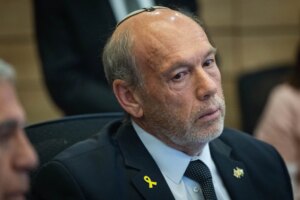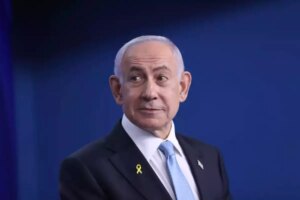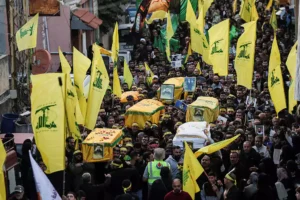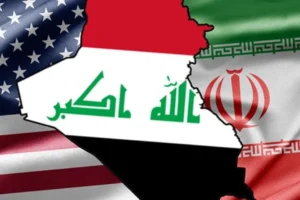
Former Mossad chief Yossi Cohen appeared in a prime-time interview with Channel 12 news on Saturday, using the platform to discuss his recent hints about a possible political career alongside his views on security, the lead-up to the October 7, 2023, massacre by Hamas, and Israel’s leadership.
The wide-ranging conversation, tied to the launch of Cohen’s new autobiography “By Stratagems You Shall Wage War,” came a week after he declared that he should lead the country, saying the public is demanding “real change” and that “for real change to happen, I need to be prime minister.”
Cohen has long been linked to Prime Minister Benjamin Netanyahu, who appointed him as Mossad chief in 2016 after his tenure as national security adviser and reportedly considered him a potential successor as premier, along with Strategic Affairs Minister Ron Dermer.
In a lengthy sit-down with Channel 12 journalist Dana Weiss, Cohen – who stepped down as spy chief in 2021 – said Netanyahu should no longer serve as premier, claiming he “can’t unify” Israel the way it needs to be.
He also sharply criticized Israel’s military chiefs, defended his role in the controversial Qatari funding of Hamas-ruled Gaza over the years, and laid out his political red lines — while insisting he is “not yet” entering politics.
Get The Times of Israel’s Daily Edition
by email and never miss our top stories
By signing up, you agree to the terms
Anger over October 7
In both his book and interview, Cohen expresses anger at the security establishment for failing to prevent the Hamas-led October 7 invasion and massacre that launched the ongoing war in Gaza.
From right to left: Prime Minister Benjamin Netanyahu, new Mossad chief David Barnea and the intelligence agency’s outgoing leader Yossi Cohen, on June 1, 2021. (Kobi Gideon/GPO)
“We are all in deep pain — myself included… The defense establishment is responsible for its sector; you should have known, known how to thwart [the attack], and known how to defend the borders when it collapsed. I was stunned. I think this is something unforgivable,” he said.
Cohen said that 36 hours after the attack, he warned Netanyahu not to rely too heavily on advice from IDF and Shin Bet officials “who had already been party to the disaster.”
He said he told the premier bluntly to “not rush into Gaza” without carefully reviewing the intelligence provided by the bodies.
“I told him: examine very carefully the intelligence they present to you. Examine very carefully the readiness of the IDF before you decide to enter the Strip. They will tell you they know — did they? They will tell you they are ready — were they? They will tell you the army can go in tomorrow morning. Don’t buy it.”
He added that the premier appeared to be in a controlled state of mind at the time, saying: “Bibi knows how to stay in control. This is not a man who easily falls apart under pressure, ever.”
Cohen criticized what he called a long-standing “doctrine of avoidance” in the military, saying that over the years, he recalled “weighty discussions” about striking Iran or Hezbollah, but “no decision was ever made.”
People drive on a street past portraits of slain Lebanese Hezbollah leader Hassan Nasrallah and buildings damaged in Israeli strikes in the recent war, amid the first round of municipal elections, in the Ghobeiry neighborhood of Beirut’s southern suburb on May 4, 2025. (ANWAR AMRO / AFP)
He said that despite his own suggested offenses against Iran, Hezbollah and Hamas, “the ones who stopped me were mainly the heads of the security establishment.”
“During my tenure, I thought there were things Hezbollah was doing that had to be stopped. And yet, it wasn’t carried out,” he said.
He also disclosed that he had wanted Mossad to share responsibility for Hamas. “I wanted to contribute all the Mossad’s capabilities to Gaza,” he said, but claimed IDF and Shin Bet leaders resisted this to protect their “hegemony.”
While he did not argue this would have prevented October 7, Cohen insisted it would have “necessarily strengthened our ability to deal with strategic surprises.”
Netanyahu, he said, sided with those who told him “there’s no need.”
Responsibility, he said, ultimately lies with the political echelon: “The prime minister gives the orders, and the security chiefs execute them.” He added, however, that “when a prime minister receives such forceful assessments, it makes him hesitate.”
IDF Chief of Staff Aviv Kohavi attends an Aharai! Youth Program ceremony, at Mount Herzl in Jerusalem on June 17, 2022. (Flash90)
Cohen highlighted the case of Iranian general Qassem Soleimani – the head of Tehran’s elite Quds Force who was killed in a US drone strike in Iraq in early 2020 – as an example of what he saw as Israel’s overcautious generals.
While US President Donald Trump has accused Netanyahu of cowardice for backing out of the strike against Soleimani, Cohen said Israeli reluctance “wasn’t because of the prime minister — but because [Netanyahu] accepted the army and military intelligence’s position,” citing then–chief of staff Aviv Kohavi.
After Cohen’s remarks were aired Saturday evening, Kohavi issued a statement saying the IDF had opposed a different operation proposed by Cohen to kill Soleimani, and had backed what proved to be a successful operation.
Asked if Netanyahu might have acted differently in another environment, Cohen replied: “Yes, absolutely.”
Cohen recalled telling the then-CIA director that Israel would not join the US strike on Soleimani, after which she quipped — as he quotes in his book — “Your generals, like ours, don’t like to fight.” Pressed on whether that was true, Cohen replied: “I think they wanted to avoid wars,” but rejected any suggestion that they were cowards.
He recalled a security discussion where he proposed that the IDF strike a specific site related to Soleimani, which the army itself had defined as a severe strategic threat, without specifying the date. “The chief of staff opposed me, right there. I told the prime minister: ‘Instruct him.’ But no directive was given.” Netanyahu, he said, deferred to his generals — out of what Cohen described as a “policy of consequences.”
Asked if the generals intimidated the premier, he said: “Absolutely.”
Prime Minister Benjamin Netanyahu (left) and IDF Chief of Staff Herzi Halevi at a security assessment at the military’s Northern Command, December 7, 2023. (Amos Ben Gershom/GPO)
The Qatari cash flow
Cohen also addressed Israel’s reliance on Qatari funds in an effort to bring calm to the Gaza Strip in recent years – a controversial move closely tied to his position, which he has previously described as a mistake.
Since October 7, Netanyahu, who publicly endorsed the policy, has been widely criticized over the measure, which was intended to ease financial pressure on Gazans, for ostensibly having helped fund Hamas’s military operations.
Cohen insisted the mechanism “was not mine,” saying it originated with the Shin Bet security agency and the IDF’s Coordinator of Government Activities in the Territories unit, and denied ever working for Qatar.
Following the interview, the Shin Bet immediately issued a statement denying that it had initiated the policy.
“I was asked by the State of Israel to bring more Qatari money to Gaza’s civilians… I have no business with Qatar, never received money from Qatar, was never recruited by them, and never sought to promote their interests,” Cohen continued.
When pressed that former Shin Bet chief Nadav Argaman had opposed the funds from the outset, warning they fueled Hamas, Cohen declined to comment directly. “I don’t discuss a Shin Bet chief one way or another,” he said.
Critics have accused Cohen of rewriting history to distance himself from the scandal, but Cohen rejected that characterization, while conceding that the mechanism later “collapsed,” but added: “I also warned that it was collapsing. Argaman pounded on the table. Did it help?”
Shin Bet head Nadav Argaman attends a Knesset Defense and Foreign Affairs Committee meeting on November 6, 2018. (Hadas Parush/Flash90)
He insisted responsibility for the policy lay higher: “Israel’s policy on Qatari money wasn’t set by the Mossad chief. It was set by the State of Israel and its leader.”
Cohen confirmed he traveled to Qatar in 2020 to request funds, but said he was following government orders.
On the so-called Qatargate scandal — revelations that a top Netanyahu aide allegedly received money from Qatar while pushing the Prime Minister’s Office to shift its policies to be more sympathetic to Doha — Cohen was unequivocal. “It is inconceivable that an employee in the Prime Minister’s Office is operated or paid by a foreign state. I would have frozen their work immediately.”
Asked whether he still has connections in Doha, Cohen replied cautiously: “If I needed to get there, I could arrange it. Yes. But I haven’t been back since that one known visit.”
Cohen also denied any wrongdoing in the “submarine affair” scandal concerning naval purchases by previous Netanyahu governments. A state commission of inquiry last year said that the former Mossad chief’s conduct in the purchase of the submarines “resulted in the serious disruption of work processes and force building, and harmed the decision-making process in a series of sensitive issues, thereby jeopardizing national security and harming the foreign relations and economic interests of the State of Israel.”
Cohen said he found that accusation shocking and that he did not doubt that it would be proven false.
Drawing political lines
Though vague about his political plans, Cohen laid down some red lines.
If he were to enter politics, he said his natural home would be Netanyahu’s Likud party — but in what he called a “new iteration,” with a “massive” turnover in its ranks. “The new Likud,” he said of the ruling party.
National Security Minister Itamar Ben Gvir seen after a visit to the Temple Mount in Jerusalem Old City, August 3, 2025. (Chaim Goldberg/Flash90)
Pressed about possible coalition partners, Cohen said he hasn’t yet considered the matter, but that he “apparently would not” sit in a government with far-right politicians Bezalel Smotrich and Itamar Ben Gvir, both of whom are senior members of Netanyahu’s coalition.
Asked which partner he would be most resistant to, he responded, “probably Ben Gvir.”
“Ben Gvir is a red line for me. I couldn’t accept his diplomatic stance,” he said about the national security minister, a former disciple of outlawed extremist rabbi and politician Meir Kahane.
Cohen defined himself as politically “right-wing,” though he said he did not back the current hardline government’s 2023 judicial overhaul plan, spearheaded by Justice Minister Yariv Levin, to sharply curb the powers of Israel’s judicial branch.
“There are institutions we built with blood, sweat and tears that must be defended. I don’t sign on to Yariv Levin’s approach. When I warned in July 2023 against the reform, it was with deep pain — because the fight itself was weakening our national resilience. Stop fighting.”
As for Netanyahu, Cohen said that while the premier “did many things out of a deep faith in Israel’s good… At this time, now, change is required.”
Prime Minister Benjamin Netanyahu (left) and head of the Mossad Yossi Cohen during a toast ceremony for the Jewish New Year on October 2, 2017 (Haim Zach/GPO)
He said that Israel needs “to move away from divisive factionalism and to talk about unity. [Netanyahu] can’t do that. He can’t unify what needs to be unified right now.”
Pressed if that rules out joining a Netanyahu-led government, Cohen said: “Let’s take it step by step. When I decide to enter politics, I’ll say how. I’m not challenging any politician — I’m not a politician myself. But Israel needs different leadership now.”
Questioned whether he would run in the 2026 elections, Cohen said he currently planned not to, and that he was undecided on whether to aim for the premiership.
“I don’t know. Not yet,” he said.





